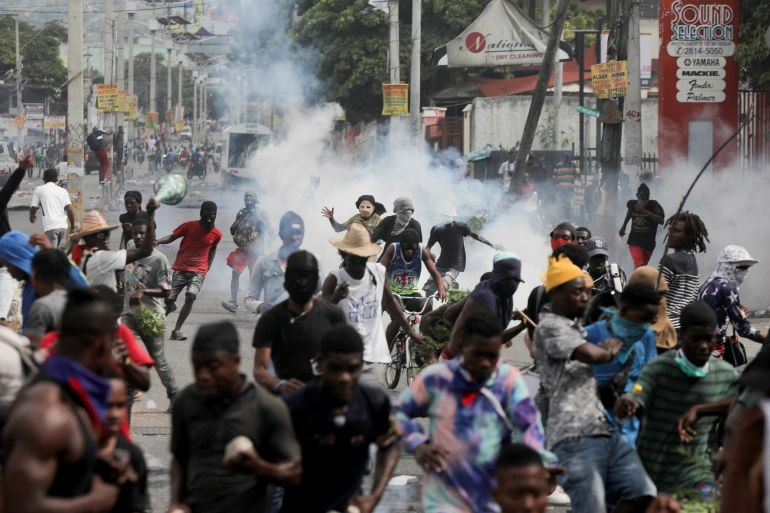Tracing the roots of Haiti's US-sponsored troubles
The US and Canada have been shipping military equipment to Haiti for "security" reasons, including armored vehicles used by police against "criminal gangs".
-

Protests in Haiti in October (Reuters)
Since the summer of 2018, Haiti has been the scene of massive protests, demonstrating against the social conditions worrying people since August 22 of this year, and also against the government's request for foreign intervention in the country.
The interim prime minister of the island, Ariel Henry, relayed his government's intent to ask for international assistance to handle the situation after writing to United Nations Secretary-General Antonio Guterres to enforce a military intervention through the organization. On the 10th of October, Guterres accepted the request and asked the international community for military aid to help bring Haiti back on its feet.
Shortly after Henry's request, the US government sent a delegation to Haiti to revise the situation. On October 17, the UN Security Council convened to discuss a suggestion by the US and Mexico to deploy non-UN troops, afterward announcing the imposition of sanctions against what they called leaders of "gangs".
The US and Canada have been shipping military equipment to Haiti for "security" reasons, including armored vehicles used by police against "criminal gangs". It was reported that until October 28, Haiti was receiving additional weaponry.
The trace-back to where it began
1791 is the year that the black enslaved people of Haiti executed the first black revolution and in 1804, established the first Black Republic in the Western Hemisphere. For the next 218 years, self-determination, social justice, and socioeconomic independence remained on the top of the Haitian people's agenda as they struggled against occupation, instability, US intervention, government corruption, natural disasters, and the payment of reparations to their former enslavers.
Read more: Haiti, Wounded Mother
According to a New York Times article in May 2022, Haiti took a loss of approximately $115 million, eight times the size of its economy in 2020. Prior to invading the island, the US stole $500,000 worth of gold from the National Bank of Haiti, transported the gold via the USS Machias, which ended up in the vault of what is now Citibank. Later, the island took an ever deeper loss at the hands of dictator and US-backed Francois Duvalier, known as "Papa Doc", and his son Jean-Claude Duvalier "Baby Doc", from 1957 to 1986.
Another US-led mess came along with coups against Haiti's president Jean-Bertrand Aristide, first in 1991 and in 2004 after flooding the country with US-grown rice, which sold for much cheaper than locally-grown.
The Canada-Haiti Information Project reported that since 1995, more than $13 billion in subsidies has been given by the US to US rice farmers, keeping its prices significantly lower than rice produced by Haitian farmers - that put Haitian farmers at a loss because they cannot compete with a disproportionate agreement that ultimately forces many of them out of business.
To counteract this, Haiti tried to raise the minimum wage to meet the prevailing social conditions, but US intervention once again blocked that from happening. However, the PetroCaribe Agreement established in 2005 by Venezuela under the late President Hugo Chávez offered affordable prices for petroleum products, in an attempt to strengthen socio-economic development.
Haiti was a part of that agreement but since the US had sanctions imposed on Venezuela, it wasn't possible for Haiti to participate, nor to benefit from it.
The ensuing crises in Haiti are not a result of the "criminal gang" activity but of the US-backed and Western-puppeteered coups and interventions that constantly drive the island into chaos. Haiti is battling food insecurity, high inflation and fuel shortages, and the end of foreign interference and intervention in the internal affairs.
The people are also demanding the resignation of interim president Ariel Henry on account of his incapability of resolving the socio-economic crisis he vowed to take care of.

 4 Min Read
4 Min Read








